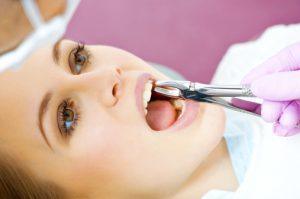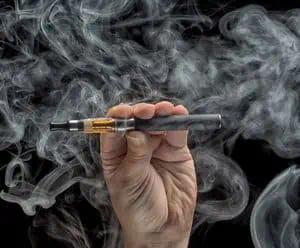After going through the process of a tooth extraction, it’s important to follow the procedure up with proper care.
You may be wondering what exactly you can and can’t do after a tooth extraction. For example, can you eat food? Drink a soda? And how long will it take before your mouth gets back to normal?
Keep reading as we dive into exactly what the dos and don’ts after tooth extraction are, just how soon you can eat, how to make sure it heals quickly, and how long it will take for the hole to close.
The key to fast healing at the extraction site
Usually, it will take between one and four months for the hole at the extraction site to close. How quickly it closes depends on how well you care for it as well as how extensive the procedure was.
The most important thing that needs to take place post-operative is for the blood clot to form. This will allow the bleeding to stop and get you on the road to recovery.
Read more in our article about how to stop bleeding after a tooth extraction.
Guidelines for teeth extraction aftercare
To properly care for your mouth after having teeth extracted, you should follow post-operative instructions from your dentist. Once you finish with surgery, you will be given some gauze to bite down on. This is an important first step to help with stopping the bleeding.


- Keep the gauze pad in place over the hole for a few hours post-surgery. When you put pressure on it, this allows a blood clot to form where the tooth was.
- Plan to rest. While it’s safe to get back to your regular activities the day after surgery, try to avoid any strenuous activity or exercise for the next week.
- Apply an ice pack to your face around the extraction site to help reduce swelling.
- After 24 hours have passed, rinse your mouth with warm saltwater.
- Take pain medications prescribed by your dentist (or over-the-counter medications) as directed.
- Drink water after surgery.
- Keep your head elevated while sleeping to heal properly and quickly.
- Eat soft or liquid food for at least the first 24 hours, if not longer.
- Do clean your teeth as normal, but brush gently around where the gum is still healing and avoid the extraction site.
What can you not do after tooth extraction?
There are plenty of steps you can take post tooth extraction to help ensure you don’t wind up back in the dentist’s chair too soon. Many of these are common sense, but some may not be so obvious.


- Don’t spit or rinse for 24 hours following the tooth extraction so that you don’t dislodge the blood clot from the socket.
- Don’t use a straw for a week post-surgery to prevent the blood clot from being dislodged from the socket. Read more about straws after extraction.
- Wait at least 72 hours after the extraction to smoke.
- Don’t drink alcoholic, caffeinated, or carbonated beverages for 24 hours.
- Avoid very hot or cold liquid (like coffee) for a few days.
- If you need to eat while your mouth is still numb, bite gently to avoid hurting your tongue or lips.
- Don’t eat things that can get lodged in the hole. This includes food like fruit seeds or nuts.
- Try not to poke at the site of the extracted tooth with your tongue, as this may keep the socket exposed.
How soon can I eat after tooth extraction?
After a tooth extraction, you will want to stick to soft food for at least a day or two. Basically, you want to avoid food that requires you to chew because chewing can cause pain. Also, you want to avoid hard foods because they could become lodged in the hole at the extraction site.
Some easy food you can eat during the first day or two include:
- Yogurt
- Applesauce
- Pudding
- Mashed potatoes
- Ice cream
A lot of people like to eat smoothies too, but just make sure you use a spoon instead of a straw.
As you continue to heal from the procedure, you can begin to add more foods back into your diet such as scrambled eggs or avocados. After about a week, you will be able to get back into the normal swing of things, engage in physical activities, and resume your regular diet, including solid foods.
How can I make my tooth extraction heal faster?
To make your tooth extraction heal faster, and to avoid complications, you will want to take good care of the extraction site and follow any instructions your dentist has given to you.
By getting plenty of rest, using an ice pack to reduce swelling, and eating soft foods like mashed potatoes, your recovery should be smooth, ultimately resulting in a shorter recovery time.
Keeping the blood clot in place
It’s important that your blood clot does not become dislodged. If that does occur, you could get dry socket. Dry socket delays the healing process and can also be extremely painful. You can prevent dry socket by following the dos and don’ts listed above.
If you begin to experience intense pain or notice the blood clot partially or fully missing, you will want to call your dentist immediately so they can help you treat it. Generally, most people recover from dry socket in about a week after visiting their dentist.
Conclusion


A tooth extraction can be a painful process. To make sure your extraction hole heals properly and you don’t get an infection, it’s important to follow a few simple dos and don’ts after tooth extraction, as we listed above.
By eating soft foods, using ice packs for swelling, getting rest, and not using straws, spitting, or smoking, you will quickly be on your way to healing completely within one to four months.
If you have excessive bleeding or pain, you dislodge your blood clot, or have questions about medication, it’s best to call your dentist immediately to schedule an appointment.




